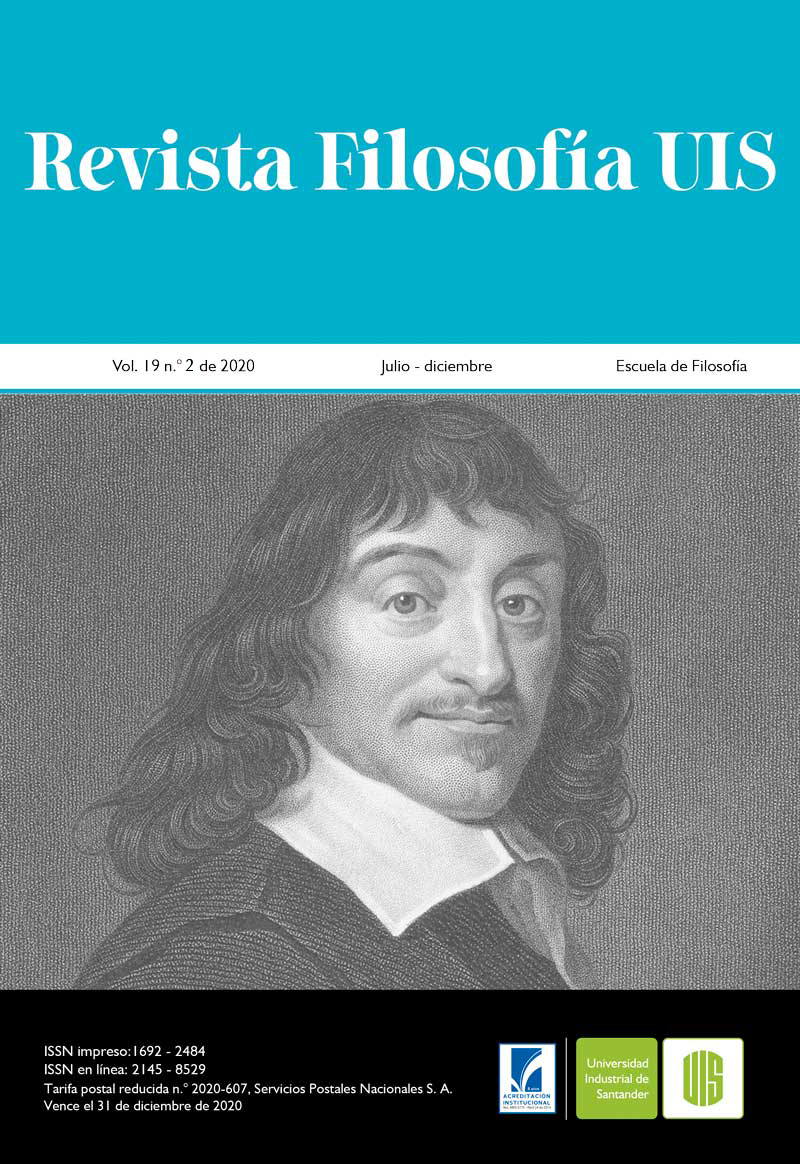An approach to the concept of justice in British historicism of the 18th century
Published 2020-05-29
Keywords
- justice,
- private property,
- sympathy,
- selfishness,
- moral
How to Cite
Copyright (c) 2020 Revista Filosofía UIS

This work is licensed under a Creative Commons Attribution 4.0 International License.
Abstract
In the England of the XVIIIth century several of the most important thinkers of the epoch were assembled, who were coming from different zones of the United Kingdom, like is the case of David Hume and Adam Smith, who come from of Scotland, as Edmund Burke native to Ireland, which contributed their ideas in favor of resolving the most important disadvantages of the British society, among them was justice. It is as well as, from the philosophical perspective, economic and political, it can be reached to the proper concept of justice that was reigning in an epoch that Maurizio Fioravanti called the British historicism, a model that as the individualism and the estatism predominated in the century of the revolutions. The objective of the article is conceptualize to the justice under the human philosophical proposal based on the association of ideas and the theory of the passions; the economic gaze smithiana been ruled by the idea of the impartial spectator and the invisible hand; in addition to the political perspective burkean oriented by his political iusnaturalism.
Downloads
References
Botero, A. (2003). La metodología documental en la investigación jurídica: alcances y perspectivas. Opinión jurídica, 2(4), 109-116.
Botero, A. (2015). Fioravanti visita Colombia: sobre la aplicación de los modelos de cartas de derechos constitucionales. Revista Filosofía UIS, 14(2), 15-47.
Burke, E. (2013). Reflexiones sobre la Revolución en Francia. (C. Mellizo, trad.). Alianza Editorial.
Del Hierro, P. (2019). La invisible “mano invisible” de Adam Smith. Revista de economía institucional, 21(40), 143-161.
Fioravanti, M. (1998). Los derechos fundamentales: apuntes de historia de las constituciones. (M. Martínez, trad.). Trotta.
Gallo, E. (1984). La tradición del orden social espontáneo: Adam Fergurson, David Hume y Adam Smith. Revista Libertas IV, (6), 1-15. http://www.eseade.edu.ar/files/Libertas/44_5_Gallo.pdf
González, A. (2008). La justicia como virtud artificial en Hume. Elementos para una teoría Psico-Social de la acción. Pensamiento, 64(239), 97-127. http://revistas.upcomillas.es/index.php/pensamiento/article/view/4589
Hampsher, I. (1996). Historia del pensamiento político moderno: los principales pensadores políticos de Hobbes a Marx. Ariel.
Hume, D. (1984). Tratado de la naturaleza humana. Ediciones Orbis S.A.
Hume, D. (2007). An Enquiry concerning Human Understanding and Other Writings. Cambridge University Press.
McIlwain, C. H. (1991). Constitucionalismo antiguo y moderno. Centro de Estudios Constitucionales.
Mckendrick, N., Brewer, J. & Plumb J.H. (1983). The Birth of a Cosumer Society. Hutchinson.
Moore, G. (1992). A propósito de David Hume y su obra. Norma.
Ruggiero, G. (1944). Historia del liberalismo europeo. Pegaso.
Sen, A. (2010). Adam Smith y el mundo contemporáneo. Erasmus Journal for Philosophy and Economics, 3, 50-67.
http://ejpe.org/pdf/3-1-art-3.pdf
Smith, A. (1598). The Theory of moral sentiments. Millard.
Smith, A. (1992). Investigación sobre la naturaleza y causa de la riqueza de las naciones. Fondo de Cultura Económica.
Smith, A. (2009). La teoría de los sentimientos morales. Alianza Editorial.
Suñé, E. (1987). El iusnaturalismo político de Edmund Burke. Revista Persona y Derecho, (16), 205-351.

